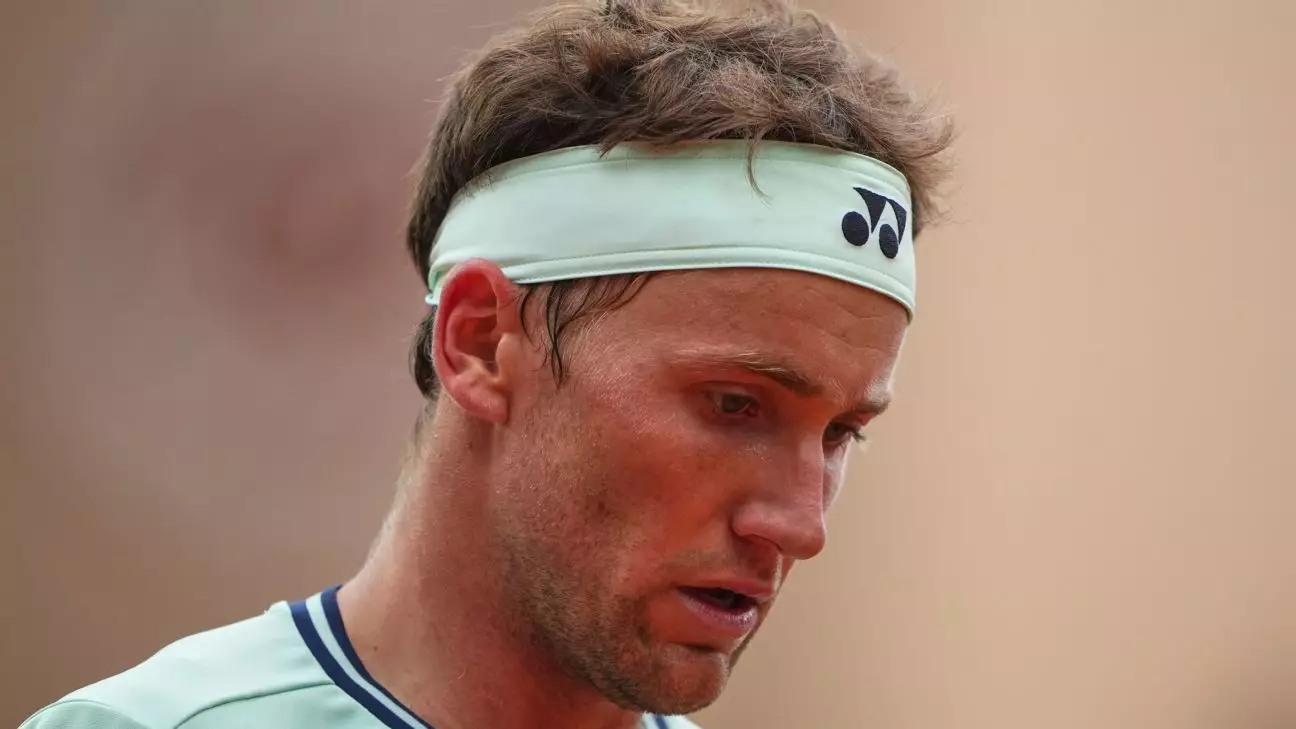Casper Ruud’s exit from the 2023 French Open was nothing short of heartbreaking for both the player and his fans. Once a stalwart on the clay courts of Roland Garros, Ruud’s journey came to a jarring halt as he succumbed to Nuno Borges in a dismantling loss of 2-6, 6-4, 6-1, 6-0. This defeat not only marked his earliest departure from the tournament since his first-round exit in 2018 but also highlighted the toll that physical ailments can take on an athlete’s performance. Hobbled by a persistent knee issue that has plagued him throughout the season, Ruud’s struggle paints a vivid picture of the behind-the-scenes realities of professional sports, where pain, frustration, and unforeseen setbacks often collide.
Despite his ranking as the seventh seed and his impressive track record of reaching the semifinals in the previous three years—including a finals appearance against legends Rafael Nadal and Novak Djokovic—Ruud’s resilience was put to the test in this match. His physical state was further exacerbated as he hunted for solutions to manage his discomfort, which involved painkillers and anti-inflammatory medication. But in a sport that demands peak physical performance, such coping mechanisms can only go so far when faced with the level of competition present at a Grand Slam.
A Match Defined by Discomfort
During the match against Borges, it became increasingly evident that Ruud was playing against more than just his opponent. The pain in his knee surged to the forefront, affecting his strategy and execution. Ruud openly confessed that certain movements—specifically his open-stance backhand—were excruciating to perform. This tactic of avoidance, while understandable, ultimately hinders a player’s natural rhythm and performance. It’s a stark reminder of how injuries can overshadow a player’s capabilities, transforming the court into a battleground against not only an opponent but also one’s own body.
What adds another layer of complexity to Ruud’s situation is the psychological battle that accompanies physical ailments. Professional athletes often feel the pressure to perform at their best regardless of injuries, a burden that can exacerbate their physical issues. As Ruud expressed, there is a distinction between how one practices and how one competes. In matches, the stakes are high, leading to decisions that may not always align with injury management. This can create a dangerous cycle where pain compromises performance, which in turn heightens stress and anxiety.
A Missed Opportunity for Ruud
The disappointment of exiting early in such a prestigious tournament can impact an athlete’s morale and trajectory. Ruud’s aspirations to regain his previous form and contend for the title were abruptly derailed, leaving a gap in his season due to the withdrawal from the Geneva Open. As he alluded to the need for further medical evaluations, one can only speculate how long this injury might linger and how it could affect his performance in subsequent tournaments.
Furthermore, the emotional toll of remaining at the tournament while grappling with injury only compounds the situation. Ruud expressed his wish to hold on longer, indicating a commitment not just to the event, but to the fans and the sport that define him. It’s an evolving narrative of resilience, yet it’s laced with sorrow for what could have been—particularly against a backdrop of a tournament where he has historically excelled.
The Rise of Borges
As Ruud faced physical trials, Borges emerged as a beacon of potential and opportunity within the match. The 41st-ranked player made headlines by advancing to the third round, marking a significant moment in his career as the first Portuguese man to achieve such a feat at the French Open. This juxtaposition between Ruud’s struggle and Borges’ breakthrough serves as a poignant reminder of the unpredictable nature of sports. While Ruud battles with his knee, Borges seizes the moment, creating a narrative of hope that intertwines with the challenges of his opponent.
The game of tennis, particularly in high-stakes situations like Grand Slams, often relies on the ability to adapt and overcome challenges—both internal and external. Borges demonstrated resilience and tenacity, while Ruud’s scenario serves as a testament to the harsh realities athletes often face.
Future Outlooks
As Casper Ruud contemplates the next steps in his recovery, one wishes him the best in returning to the level that saw him celebrated on clay courts. His experiences underscore the fragility of athletic prowess; in a sport where every match counts, the most formidable opponent can sometimes be one’s own body. It serves as a critical reminder for young athletes and fans alike—success in sports is not merely a function of physical skill but is often a symbiotic interplay between mind and body, where perseverance becomes just as vital as technique. As the tournament unfolds, all eyes will be on how these narratives of triumph and tribulation develop, weaving a rich tapestry of human experience into the realm of competitive sports.

